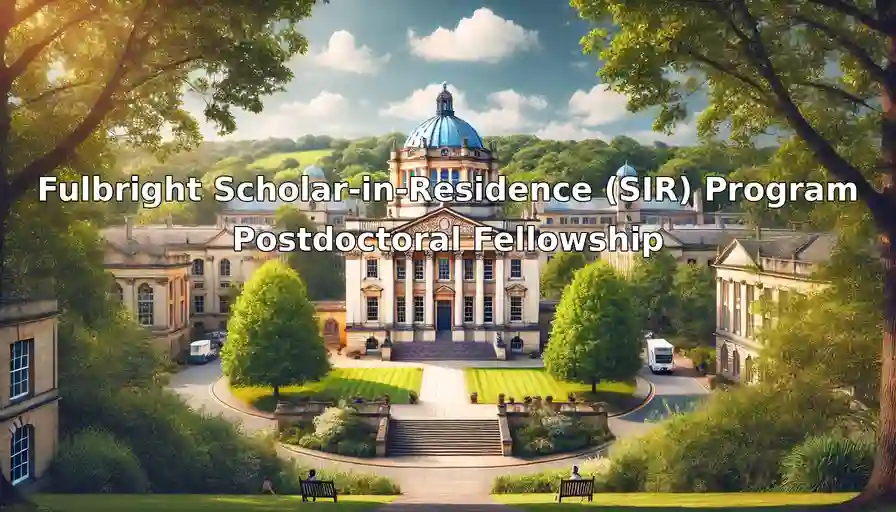The Fulbright-Nehru Doctoral Research Fellowships are esteemed awards that offer Indian scholars the opportunity to conduct significant research in the United States. These fellowships are designed to build long-term capacity to address global challenges and develop innovative solutions in key priority areas in both India and the U.S. This program is ideal for doctoral candidates seeking to enhance their research through international exposure, collaboration with distinguished faculty, and access to advanced resources. By fostering leadership, innovation, and global networking, the fellowship contributes to the professional growth of scholars and strengthens academic ties between India and the U.S.
About the Fellowship Program
- Program Name: Fulbright-Nehru Doctoral Research Fellowships
- Host Country/Region: United States
- Funded By: United States-India Educational Foundation (USIEF)
- Current Status: The program is ongoing and accepting applications for the 2026-2027 academic year.
- Scope & Objectives: The fellowship aims to provide Indian doctoral scholars with the opportunity to conduct research essential to their dissertations at U.S. institutions. It equips participants with advanced research skills, promotes cross-cultural understanding, and encourages the development of solutions to global challenges.
- Program Duration: 6 to 9 months
- Study Mode: Full-time research at a U.S. academic institution
Eligibility Criteria
To be considered for the Fulbright-Nehru Doctoral Research Fellowships, applicants must meet the following requirements:
- Academic Requirements: Must be registered for a Ph.D. at an Indian institution on or before November 1, 2024. The expected Ph.D. thesis submission date should be at least three months after the Fulbright-Nehru grant end date.
- Work Experience: While specific work experience is not mandatory, applicants must demonstrate the necessity of conducting research in the U.S. and have a thorough understanding of resources in both India and the U.S.
- Age Limit: No specific age limit is mentioned for this fellowship.
- Nationality: Open exclusively to Indian citizens.
- Language Proficiency: Proficiency in English is required. Shortlisted candidates may need to take the TOEFL exam.
- Additional Requirements:
- Employees of the Government of India and Indian State Governments are not eligible.
- Applicants must upload a copy of an original published/presented paper or extracts from their Master’s/M.Phil. thesis (not exceeding 20 pages).
Application Process
Follow these steps to apply for the fellowship:
- Online Application: Complete and submit the online application form available at https://apply.iie.org/ffsp2026.
- Review Instructions: Carefully read the FNDR Applicant Instructions before starting your application.
- Prepare Documents: Gather all required documents, including the FNDR Applicant Annexure and, if employed, the FNDR Employer’s Endorsement Form.
- Submission: Upload the completed forms and supporting documents to the online application portal.
- Recommendation Letters: Ensure that one of the recommendation letters is from your Ph.D. supervisor, commenting on your research and the necessity of the fellowship.
Required Documents
Applicants must submit the following documents:
- Online Application Form: Completed and submitted through the official portal.
- Academic Transcripts: Certified copies of academic transcripts and degree certificates.
- Research Proposal: A detailed statement outlining the research objectives, methodology, and justification for conducting research in the U.S.
- Letters of Recommendation: Three letters, including one from the Ph.D. supervisor.
- FNDR Applicant Annexure: Completed form providing additional information about the applicant.
- FNDR Employer’s Endorsement Form: For employed applicants, a letter from the employer indicating that leave will be granted for the fellowship period.
Focus Areas / Fields of Study
The Fulbright-Nehru Doctoral Research Fellowships support a wide range of disciplines. These fields align with the global and developmental priorities of India and the U.S.:
Fields of Study
Category | Primary Field | Sub-Field/Specialization | Application Areas |
Sciences | Agricultural Sciences | Food security, sustainability | |
Chemistry | Materials, pharmaceuticals | ||
Engineering & Tech | Bioengineering | Medical devices, biomaterials | |
Computer Science | AI, Quantum Computing, Cybersecurity | Data science, network security | |
Materials Science | Environmental applications | Green technology | |
Social Sciences | Anthropology | Cultural studies | |
Economics | Development economics | ||
Political Science | Strategic studies | International relations | |
Psychology | Behavioral research | ||
Sociology | Urban studies | ||
Health & Environment | Environmental Science | Climate change | |
Public Health | Pandemic surveillance | Epidemiology | |
Urban Planning | Smart cities | Infrastructure development | |
Arts & Humanities | History | Cultural heritage | |
Language Studies | Linguistics | Translation studies | |
Performing Arts | Theater, dance | ||
Visual Arts | Digital media |
These fields represent areas where interdisciplinary and cross-border research can drive meaningful change.
Financial Benefits
The Fulbright-Nehru fellowship offers substantial financial assistance, making it one of the most attractive research grants for Indian Ph.D. candidates:
- Monthly Stipend: A competitive stipend to cover living expenses in the U.S.
- Research Funding: Modest affiliation fees and support for academic resources.
- Travel Costs: Round-trip economy class airfare between India and the U.S.
- Relocation Allowance: Support for initial relocation expenses.
- Medical Insurance: Coverage under the U.S. government’s Accident and Sickness Program for Exchanges.
- Visa Support: J-1 visa sponsorship, handled in coordination with the U.S. Embassy/Consulates.
Note: No dependents’ allowance is provided. The stipend is intended solely for the grantee’s expenses.
Selection Process
The selection is thorough and merit-based, involving the following stages:
- Initial Screening (July–September 2025): All applications are reviewed for completeness and eligibility.
- Peer Review (September 2025): Subject-matter experts evaluate proposals.
- Interviews (Late October 2025): Shortlisted applicants attend virtual or in-person interviews.
- Nomination (End of October 2025): Principal and alternate nominees are selected.
- TOEFL Requirement: Nominees take the TOEFL (if not already completed).
- Final Approval (March–April 2026): The Fulbright Foreign Scholarship Board (FFSB) makes the final decision.
Key Dates
Activity | Timeline |
Application Deadline | July 15, 2025 (11:59 PM IST) |
Application Review | September 2025 |
Shortlisting and Interviews | Late October 2025 |
Notification of Nominees | End of October 2025 |
Final Approval (FFSB) | March–April 2026 |
Pre-Departure Orientation (India) | May–June 2026 |
Pre-Academic Training (U.S., if required) | July–August 2026 |
Program Start | August–September 2026 |
Tips to Strengthen Your Application
To boost your chances of selection, follow these key strategies:
- Strong Research Proposal: Clearly outline your objectives, methodology, and why U.S. resources are essential.
- Statement of Purpose: Show your commitment to research, long-term vision, and leadership potential.
- Letters of Recommendation: At least one must be from your Ph.D. supervisor; choose referees who can vouch for your academic capability.
- Published Work: Include relevant published or presented research (up to 20 pages).
- Affiliation Letter: If possible, secure a letter from a U.S. institution expressing willingness to host you.
Contact Information
For all inquiries related to the Fulbright-Nehru Doctoral Research Fellowships, applicants can reach out through the following official channel:
- Email: ffsp@usief.org.in
- Phone: Contact information is provided on request via email communication.
Conclusion
The Fulbright-Nehru Doctoral Research Fellowship is a golden opportunity for Indian scholars pursuing their Ph.D. to elevate their research on a global stage. With extensive financial support, access to prestigious U.S. universities, and unparalleled cross-cultural exposure, this program helps scholars become thought leaders and changemakers.
Quick Summary Table
Feature | Details |
Program Name | Fulbright-Nehru Doctoral Research Fellowships |
Host Country/Region | United States |
Funded By | United States-India Educational Foundation (USIEF) |
Eligibility | Indian Ph.D. scholars registered at Indian institutions |
Financial Support | Monthly stipend, airfare, visa, insurance, research allowance |
Fields of Study | Over 25 fields including STEM, social sciences, humanities, public health |
Application Deadline | July 15, 2025 |
Official Website |
Citations
- United States-India Educational Foundation (USIEF) – Fulbright-Nehru Doctoral Research Fellowships
FAQs
A prestigious fellowship enabling Indian Ph.D. scholars to conduct 6-9 months of research at U.S. institutions.
Indian citizens registered for a Ph.D. at an Indian institution by November 1, 2024, with thesis submission scheduled at least three months after the fellowship ends.
Submit your complete online application by July 15, 2025, including:
Academic transcripts
Research proposal
Three recommendation letters (one from Ph.D. supervisor)
While not mandatory, applicants must demonstrate:
Clear research justification for U.S. resources
Understanding of research landscapes in both countries
No, employees of:
Indian Central Government
Indian State Governments
are ineligible for this fellowship.
No, the grant covers only the fellow’s expenses. No additional support is provided for dependents.










